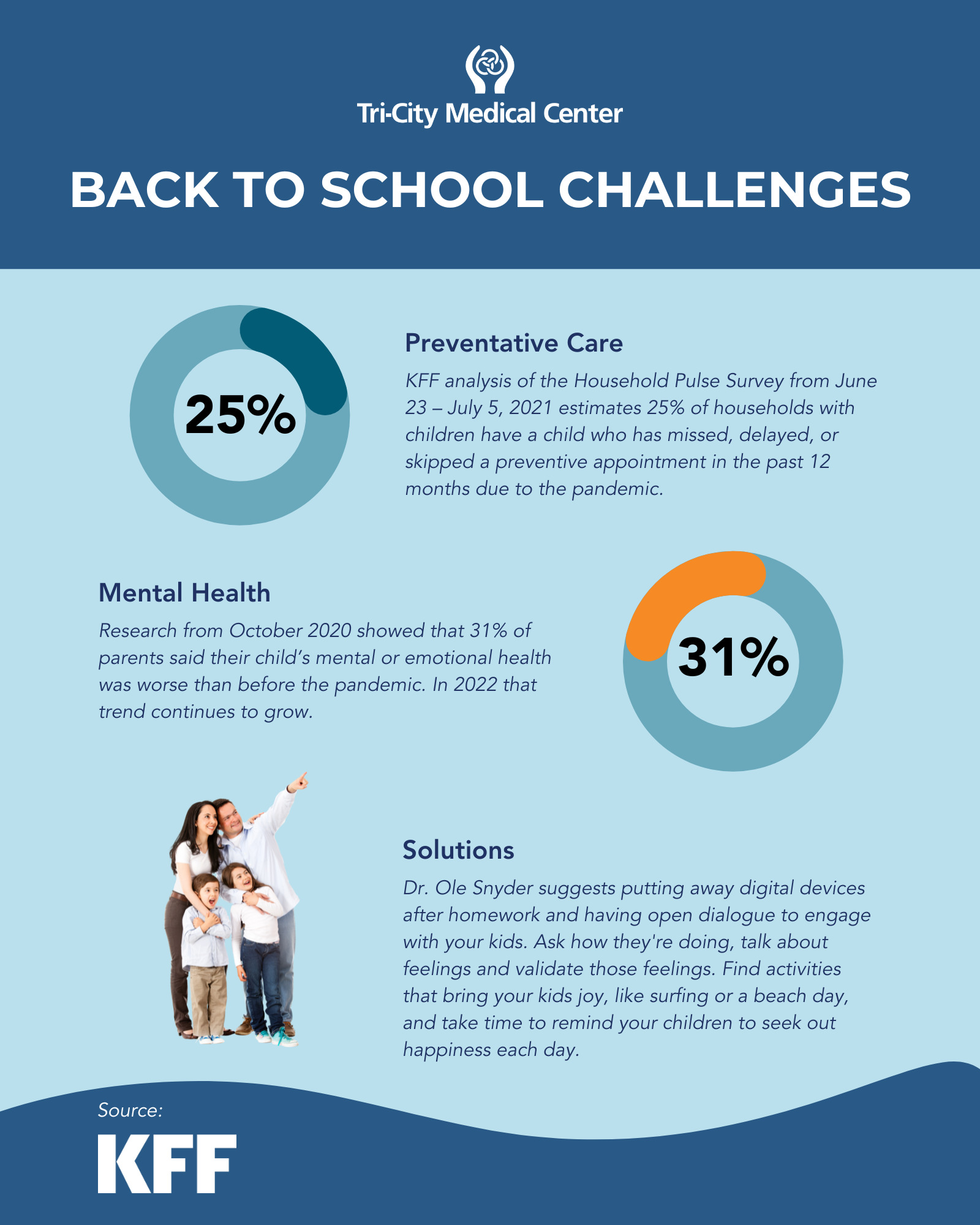 Whether your children are learning the alphabet, algebra or AP chem this school season, it’s now more important than ever to focus on their health and happiness. “The pandemic and dependence on digital devices have greatly impacted their physical and mental health, which in turn affects the whole family,” said Ole Snyder, MD, a board-certified Family Medicine physician at Tri-City Medical Center.
Whether your children are learning the alphabet, algebra or AP chem this school season, it’s now more important than ever to focus on their health and happiness. “The pandemic and dependence on digital devices have greatly impacted their physical and mental health, which in turn affects the whole family,” said Ole Snyder, MD, a board-certified Family Medicine physician at Tri-City Medical Center.
A 2021 Kaiser Family Foundation (KFF) brief describes how children’s mental health has worsened since the start of the pandemic, due to disruptions in their routines and social isolation. This has led to an increase in the symptoms of depression, anxiety and psychological stress; 22% experienced a decline in their overall mental or emotional health. Similarly, parental stress and poor mental health due to the pandemic can negatively affect their children’s mental health, as well as harm the parent-child bond.
Although the use of digital devices allowed people to stay connected during the pandemic, studies show that excessive screentime can have a negative impact on the physical and mental health of some individuals, especially teens. In the report, Are the Kids Alright?, researchers from the California Partners Project and Child Mind Institute found that adolescents suffered from headaches, lack of sleep and physical activity, and exhaustion as a result of being addicted to their phones and social media. The study also showed that teens are struggling with mental health, isolation and stress from the pandemic.
“As humans, it’s our nature to be sociable and have personal relationships,” said Dr. Snyder. “We are not designed to be interacting with digital devices all day. Excessive screentime distracts us from being fully connected. Frequently checking work emails or news apps can be anxiety provoking for parents, as can texting or posting on social media for kids.”
“As parents, it’s important for us to have an intentional and reassuring presence in our children’s lives so that we better understand what’s going on in their world and can help them navigate through tough times,” said Dr. Snyder. “By presence, I mean being fully engaged with those around you and your environment. It means spending quality time with your children and having their back, as you are the most important person in their lives.”
One of the ways that Dr. Snyder recommends “being in the mix” with your children is to put away the digital devices after homework is done and set a time to have an open dialogue about some of these hard topics. “Parents shouldn’t be afraid to talk with their kids about their feelings of isolation, sadness or depression or what’s going on at school. Some of the best times to connect are at the dinner table or the ride home after sports practice. My wife and I enjoy camping or surfing with our three kids – anyplace where there is no Wi-Fi is a great place to have an in-depth conversation.”
In addition to parental presence, Dr. Snyder recommends that families stay focused on their physical and mental health through diet, exercise, sleep, vaccinations and meaningful social/emotional connections. “Oftentimes, people come to my practice for headaches, insomnia, weight changes or fatigue, not realizing that these can be signs and symptoms of mental health problems. Or kids are acting out at school or withdrawing from family and friends. I assure them that many parents and children may have a mental health illness at some point in their life, and it’s okay and healthy to seek treatment.”
 “As a family medicine doctor, I enjoy the human connection with my patients of all ages. It’s a privilege to help them maintain their health and happiness and to watch their families grow and thrive.”
“As a family medicine doctor, I enjoy the human connection with my patients of all ages. It’s a privilege to help them maintain their health and happiness and to watch their families grow and thrive.”
To learn more about the Family Medicine Services offered at Tri-City Medical Center, call 855-222-8262.






